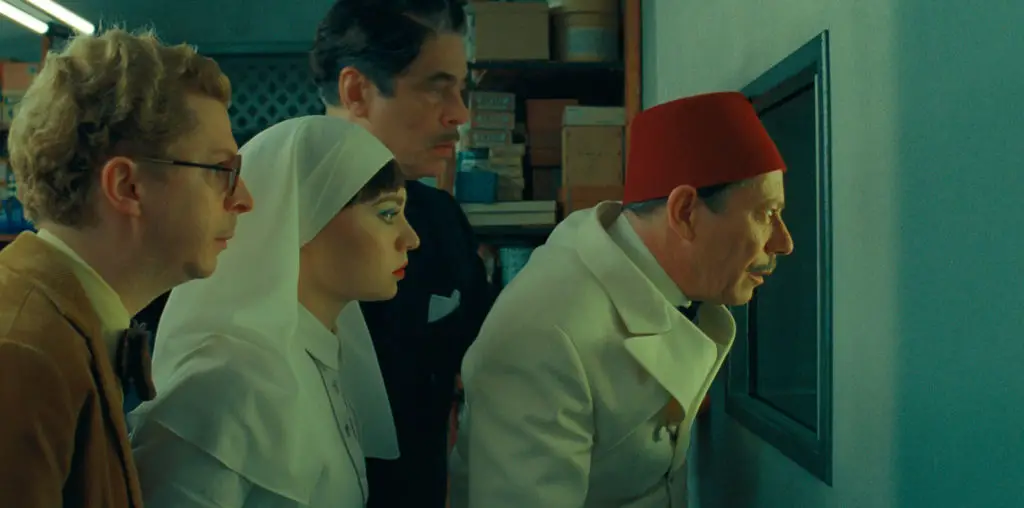
When I first heard about the plot for “The Interpreter,” I had some serious doubts that audiences in a country that’s veered as sharply to starboard as the U.S. has in the last few years would be very amenable to a movie taking place in the United Nations and co-starring ersatz peace emissary Sean Penn. Face it, the U.N. isn’t exactly on the friendliest terms with the United States these days, and artists who publicly air their dissatisfaction with the current Administration tend to see a precipitous decline in popularity (when was the last time you heard the Dixie Chicks on the radio?).
Whatever box office fate awaits “The Interpreter,” it won’t be sunk by bad reviews (more on that later). Featuring a fine cast and an intermittently engaging storyline about a possible plot to assassinate a visiting head of state, “The Interpreter” treads the same ground as classics like “The Conversation” and director Sydney Pollack’s own “Three Days of the Condor,” as well as not-so-classics like Enemy of the State.
In this case, the inadvertent eavesdropper is Sylvia Broome (Nicole Kidman), a U.N. interpreter, who – while returning to work to retrieve some things left during an earlier evacuation – overhears a cryptic conversation referring to an assassination plot. She learns the next day of an impending visit from President Zuwanie of Matobo, the African country where Sylvia herself once lived. Putting two and two together, she reports the threat to the U.N. security detail, which passes the information on to the Secret Service’s diplomatic protection squad. Enter Agent Tobin Keller (Penn, who has “world weary” down to an art form).
Agent Keller has some doubts about Sylvia’s story. She bears no love for Zuwanie’s brutal methods, for starters, and Zuwanie was also indirectly responsible for her family’s untimely demise. Keller has his own problems, coping as he is with the recent death of his wife, but he does his job in efficient if unenthusiastic fashion, until it becomes apparent that someone has taken a rather unhealthy interest in Sylvia’s case.
You can probably guess the rest: there’s rising tension as Keller and Sylvia attempt to unravel the mystery before Zuwanie’s speech to the General Assembly, all of which culminates in a not-so surprise ending. Meanwhile, Sylvia tries to convince Keller she believes in the power of diplomacy over violence. However, her continuing assertion that “words are stronger than the gun” falls flat when taking into account the events framing the film. In fact, one of the biggest problems with “The Interpreter” is how Pollack and company spend almost two hours giving lip service to the effectiveness of diplomacy when Zuwanie’s continuing reign of terror is testament to the ineffectiveness of the U.N. when it comes to homegrown genocides, be they fictional like Matobo’s, or horrifyingly real, as in Rwanda or the Sudan.
Kidman manages to keep a straight face in spite of all the logical inconsistencies surrounding her (like how she’s allowed to wander around even after the threat to her life is realized, or the assumption that an obviously traumatized Keller would be allowed to lead the investigation). And if Sylvia and Keller occasionally succumb to histrionics, well…lots of their friends are dying.
Just watch, though: reviewers are going to go on and on about what a “smart film” “The Interpreter” is, which may sound impressive, but is actually pretty sad commentary on current Hollywood product. Sure, it’s talkier than many of its contemporary counterparts, and the plot itself offers some choice red herrings and diversions, but in the end, nothing about “The Interpreter” strikes us as very original.
And why should it? When your main box office competition consists of a lunkheaded adventure yarn (Sahara), a mediocre haunted house remake (The Amityville Horror), and an upcoming spy actioner whose trailers are so stupefyingly retarded I could feel whole chunks of grey matter dying off (“XXX 2”), you don’t need to bring more to the table than a by-the-numbers thriller with a fairly pat ending.
Disagree with this review? Think you can write a better one? Go right ahead in Film Threat’s BACK TALK section! Click here>>>
